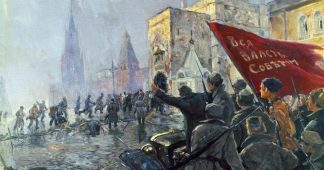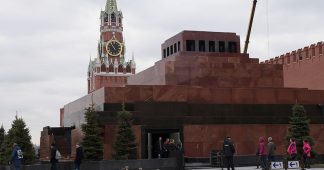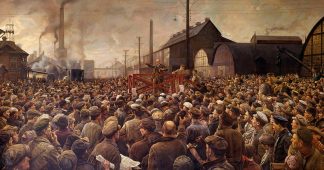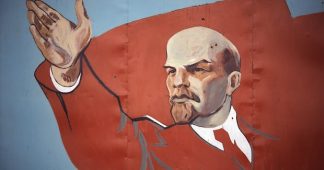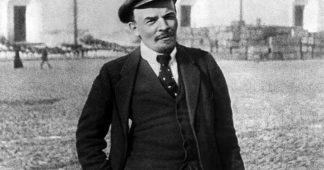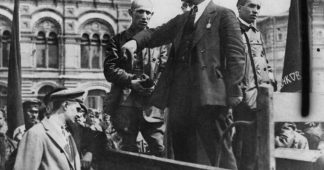By Tariq Ali
April 3, 2017
LONDON — What was Vladimir Lenin thinking on the long journey to Petrograd’s Finland Station in 1917?
Like everyone else, he had been taken by surprise at the speed with which the February Revolution had succeeded. As he traveled from Zurich across Europe to Russia, on board a sealed train courtesy of Germany’s kaiser, he must have reflected that this was an opportunity not to be missed.
That the weak liberal parties dominated the new government was to be expected. What worried him were the reports he was receiving that his own Bolsheviks were vacillating over the way forward. Theory had bound them, together with most of the left, to the Marxist orthodoxy that, at this stage, the revolution in Russia could be only bourgeois-democratic. Socialism was possible only in advanced economies like Germany, France or even the United States, but not in peasant Russia. (Leon Trotsky and his band of intellectuals were among the few dissenters from that view.)
Since the course of the revolution was thus preordained, all that socialists could do was offer support to the provisional government as it carried through the revolution’s first phase and developed a full-fledged capitalist society. Once this was completed, then they could agitate for a more radical revolution.
This combination of dogmatism and passivity infuriated Lenin. The February upheaval had forced him to rethink old dogmas. To move forward, he now believed, there had to be a socialist revolution. No other solution was possible. The czarist state had to be destroyed, root and branch. So he said as he stepped off the train in Petrograd: No compromise was possible with a government that continued to prosecute the war or with the parties that supported such a government.
The Bolshevik slogan that embodied his tactical thinking was “peace, land and bread.” As for the revolution, he now argued that the international capitalist chain would break at its weakest link. Winning over the Russian workers and peasants to create a new socialist state would pave the way for an insurrection in Germany and elsewhere. Without this, he argued, it would be difficult to build any meaningful form of socialism in Russia.
He detailed this new approach in his “April Theses,” but had to fight hard to persuade the Bolshevik party. Denounced by some for turning his back on accepted Marxist doctrine, Lenin would quote Mephistopheles from Goethe’s “Faust”: “Theory, my friend, is gray, but green is the eternal tree of life.” An early supporter was the feminist Alexandra Kollontai. She, too, rejected compromise because, she believed, none was possible.
From February to October, arguably the most open period in Russian history, Lenin won over his party, joined forces with Trotsky and prepared for a new revolution. The provisional government of Alexander Kerensky refused to withdraw from the war. Bolshevik agitators among the troops at the front assailed his vacillations. Large-scale mutinies and desertions followed.
Within the workers’ and soldiers’ councils, or soviets, Lenin’s strategy began to make sense to large numbers of workers. The Bolsheviks won majorities in the Petrograd and Moscow soviets, and the party was developing rapidly elsewhere. This merger between Lenin’s political ideas and a growing class consciousness among workers produced the formula for October.
Far from being a conspiracy, let alone a coup, the October Revolution was perhaps the most publicly planned uprising in history. Two of Lenin’s oldest comrades on the party’s central committee remained opposed to an immediate revolution and published the date of the event. While its final details were obviously not advertised beforehand, the takeover was swift and involved minimal violence.
That all changed with the ensuing civil war, in which the nascent Soviet state’s enemies were backed by the czar’s former Western allies. Amid the resulting chaos and millions of casualties, the Bolsheviks finally prevailed — but at a terrible political and moral cost, including the virtual extinction of the working class that had originally made the revolution.
The choice that followed the revolution of October 1917 was thus not between Lenin and liberal democracy. The real choice was to be determined instead by a brutal struggle for power between the Red and White armies, the latter led by czarist generals who made no secret that if they won, both Bolsheviks and Jews would be exterminated. Pogroms carried out by the Whites saw entire Jewish villages wiped out. A majority of Russian Jews fought back, either as members of the Red Army or in their own partisan units. Nor should we forget that a few decades later, it was the Red Army — originally forged in the civil war by Trotsky, Mikhail Tukhachevsky and Mikhail Frunze (the former two killed later by Stalin) — that broke the military might of the Third Reich in the epic battles of Kursk and Stalingrad. By then, Lenin had been dead for almost two decades.
Weakened by a stroke for the last two years before he died in 1924, Lenin had time to reflect on the achievements of the October Revolution. He was not happy. He saw how the czarist state and its practices, far from being destroyed, had infected Bolshevism. Great-Russian chauvinism was rampant and had to be rooted out, he realized. The level of party culture was lamentable after the human losses of the civil war.
“Our state apparatus is so deplorable, not to say wretched,” he wrote in Pravda. “The most harmful thing would be to rely on the assumption that we know at least something.”
“No,” he concluded, “we are ridiculously deficient.” The Revolution had to admit its mistakes and renew itself, he believed; otherwise, it would fail. Yet this lesson went unheeded after his death. His writings were largely ignored or deliberately distorted. No subsequent Soviet leader emerged with Lenin’s vision.
“His mind was a remarkable instrument,” wrote Winston Churchill, no admirer of Bolshevism. “When its light shone it revealed the whole world, its history, its sorrows, its stupidities, its shams, and above all, its wrongs.”
Of his successors, neither of the notable reformers — Nikita Khrushchev in the 1950s and ’60s and Mikhail Gorbachev in the 1980s — had the capacity to transform the country. The implosion of the Soviet Union owed almost as much to its degraded political culture — and, at times, the ridiculous deficiency of the bureaucratic elite — as it did to the economic stagnation and resource dependency that set in from the 1970s. Obsessed with mimicking the technological advances of the United States, its leaders cut the ground out from beneath their feet. In the revolution’s final, sorry chapter, not a few of its bureaucrats rediscovered themselves as millionaires and oligarchs — something Trotsky had predicted from exile in 1936.
“Politics is a concentrated expression of economics,” Lenin once remarked. As capitalism stumbles, its politicians and their oligarchical backers are finding voters deserting their parties in droves. The shift to the right in Western politics is a revolt against the neoliberal coalitions that have governed since the Soviet Union collapsed. Today, however, the politicians cannot blame socialism as they once did — for it does not exist.
In the national-conservative Russia of its president, Vladimir V. Putin, there are no celebrations this year of either the February Revolution or the October one. “They are not on our calendar,” he told an Indian journalist of my acquaintance last year.
“After their death,” Lenin wrote of revolutionaries, “attempts are made to convert them into harmless icons, to canonize them, so to say, and to hallow their names to a certain extent for the ‘consolation’ of the oppressed classes and with the object of duping the latter.” After his death, against the cries of his widow and sisters, Lenin was mummified, put on public display and treated like a Byzantine saint. He had predicted his own fate.
